Five Latin American families who made East Texas their home share a common theme: A love for their native home and for the United States.
Diverse art collections and religious icons, personal to each family from their countries of origin reflect a deep respect and appreciation for homeland tradition.
Each family invited interviews and photos with hospitality and enthusiasm for sharing their cultures and making new connections.
Angela and Juan Bermúdez
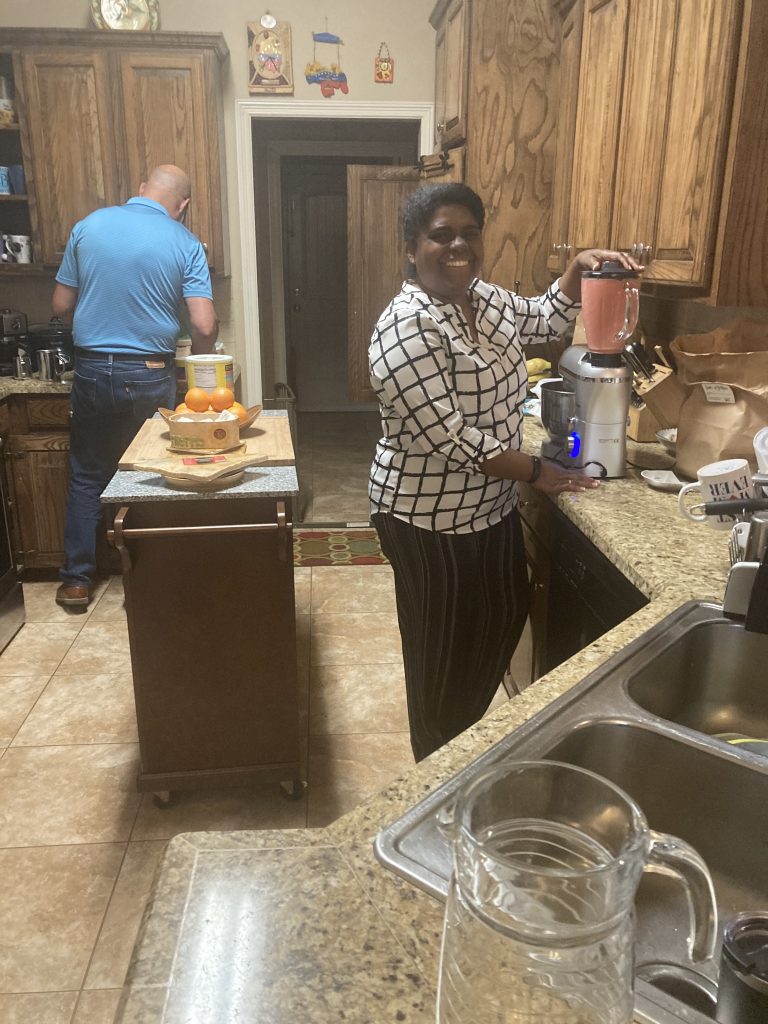
The home of Angela and Juan Bermúdez in Tyler’s Acadia Place subdivision bursts with hospitality, sharing food and gratitude “for the U.S. receiving and welcoming us.”
The family of four fled an unstable government when they came to the U.S. from Venezuela about 16 years ago. The government “went from democracy to autocracy,” said Juan, who lost his job as an engineer.
“People were fleeing for a better life,” Angela explained. Her family was able to come to the U.S. “the green way,” a term for “the easy and privileged way,” because they were able to arrive legally for Juan’s employment.
Soon, they expect to be dual citizens of both Venezuela and “the land of freedom,” Angela said. Angela and Juan have family in both Venezuela and Columbia. They last visited Venezuela in 2015.
They said they miss their families, especially around events like Mother’s Day. The Venezuelan embassy, located in Caracas, is now closed, said Juan, and there are many political problems.
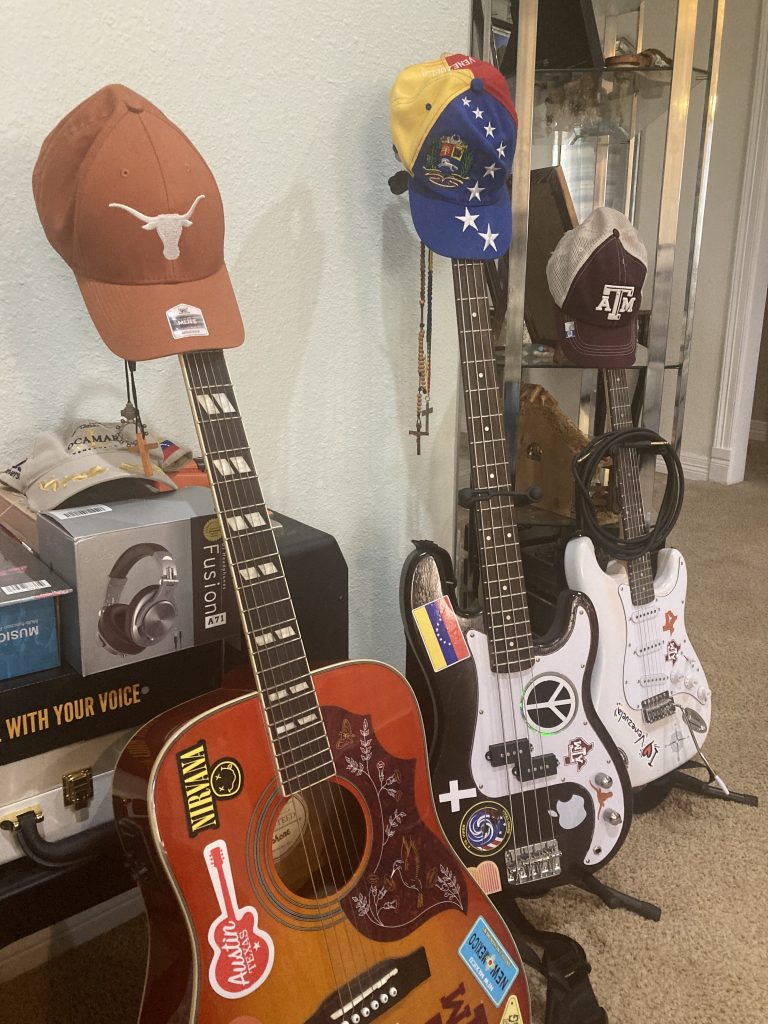
In their home, next to the seven-starred Venezuelan flag of bright yellow, blue and red are a couple of college baseball caps from the University of Texas at Austin and Texas A&M University, symbolizing the family’s lighthearted nod to their “house divided.” Their children, Karla and Jesus attend the rival Texas universities. “I told the kids, ‘We’re here, be successful,’” Juan said.
Juan, a self-described global person, wrote about what Venezuela and Texas have in common in his company newsletter: a flag with three colors, miles of rivers, mountains and nice people.
Angela, who took English lessons from the Literacy Council of Tyler, laughed while saying she thought she could speak English until she arrived at the Dallas/Fort Worth International Airport. There, she said she learned “I no got it!”
Nativity scenes, musical instruments and art pieces decorate the Bermudez home. They shared their culture by serving food: arepas, cornmeal pockets filled with eggs, meat or cheese; tequenos, similar to American cheese sticks; empanadas and coconut rice pudding. Angela said sharing food and gathering around the table is sacred in Latin American culture.
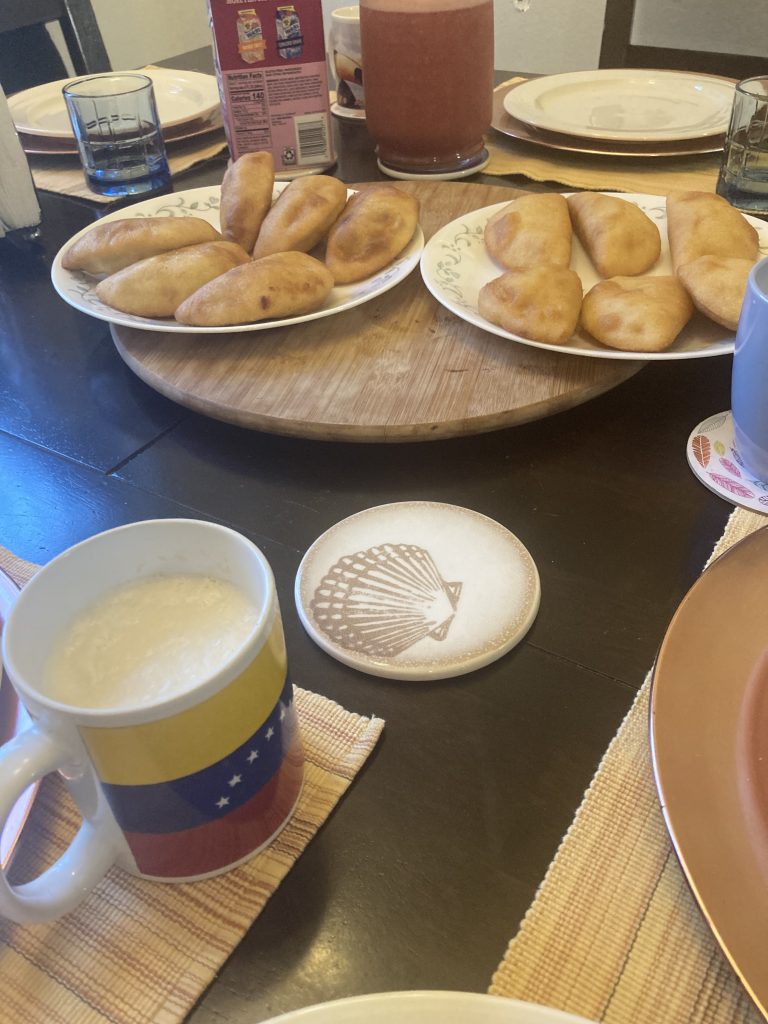
Juan has two special corners in his house: one for his music, the other for brewing his Columbian coffee. Juan brought his cuatro, the Venezuelan guitar, with him to learn to play. South American people, Juan said, are loud and happy. “It’s always a party!” he said.
Like most of the families interviewed, Juan emphasized the importance of employment and stability for him and his family.
In his company newsletter, he wrote, “I think freedom … is currently in jeopardy. While it seems lost already in my country due to local tyranny that planted division between people … in my humble opinion, freedom seems to be under constant siege here in your land as well … from both internal and external factors.
“You know the price that has been paid for freedom you have here now… but you do not want to know how it feels losing it,” he said.
Adolfo Rios
The notes of Hispanic music fill the outdoors at the Morningside home of Adolfo Rios who came to the U.S. from Guanajuato, Mexico about 25 years ago with his wife, Maria.
Rios said many Hispanic families who live in East Texas are from the Guanajuato area. He said he and his family came to the U.S. for a better life, and he is proud of the home and yard he has built in the Guanajuato style.

The Rios home, built for three generations including his five sons and one daughter, is enclosed with a curlicue wrought iron fence fashioned by Rios.
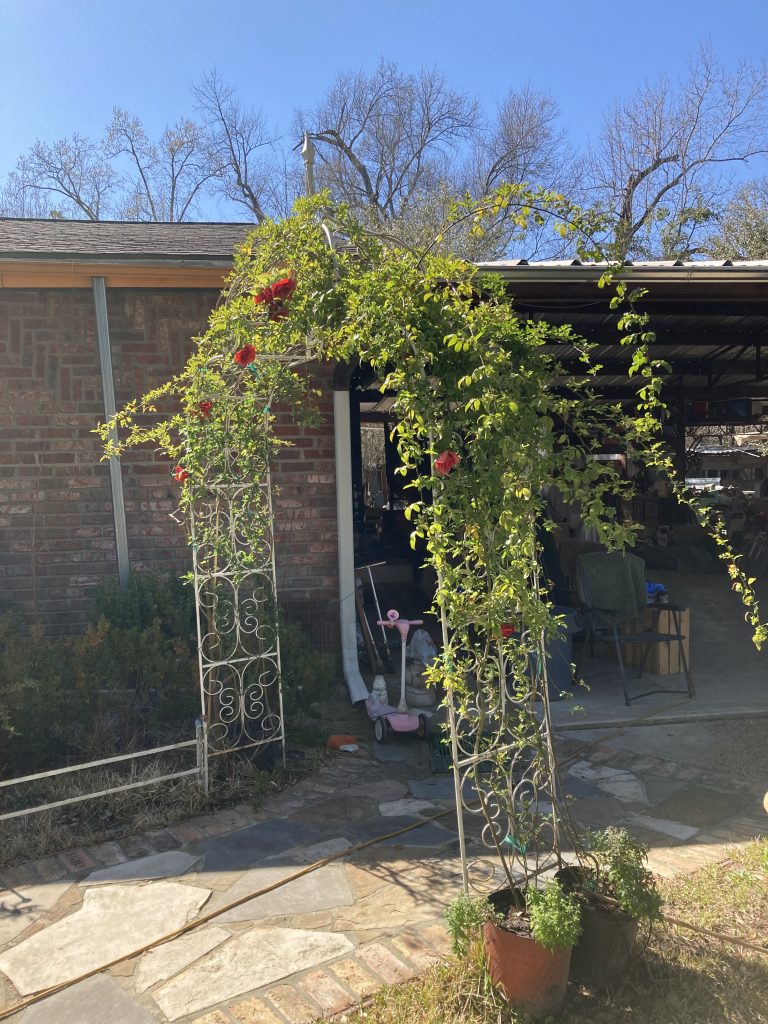
He works for a local landscaping company and also has created a water feature and special outdoor areas for his family to enjoy. Rios said he loves both Mexico and the United States. “U.S. is home – this is my country,” he said.
Maria and Oscar Tapia
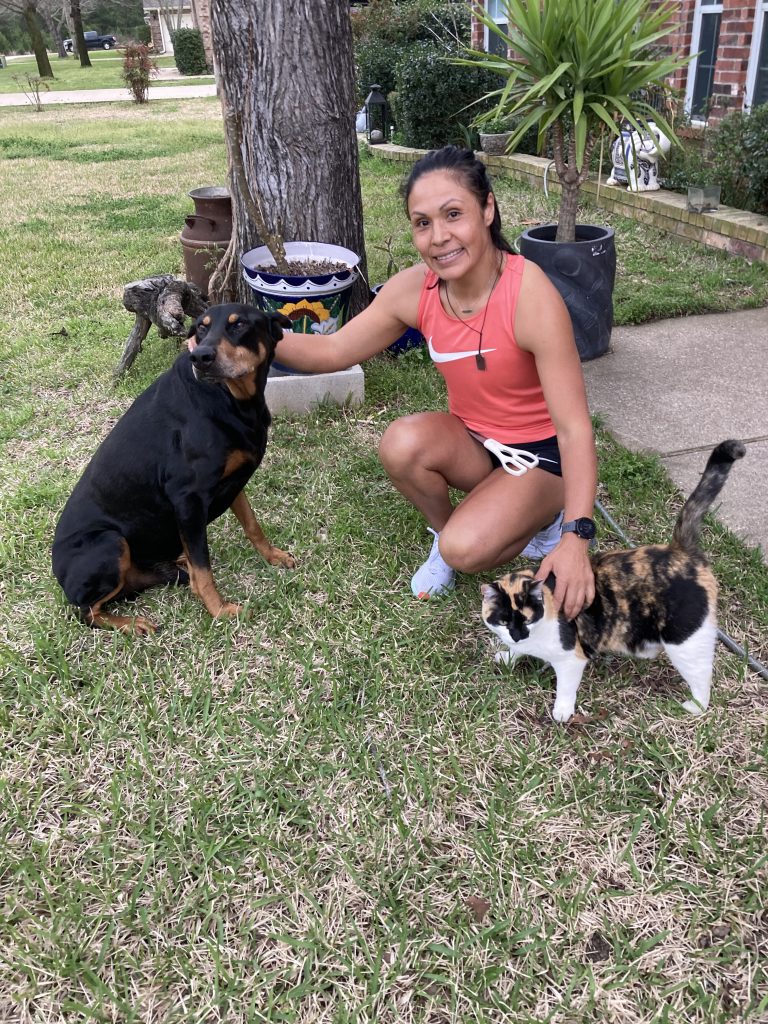
Brightly painted clay frogs and a large cross over the front door ornament the outdoor entryway to the home of Maria and Oscar Tapia in a quiet Flint neighborhood.
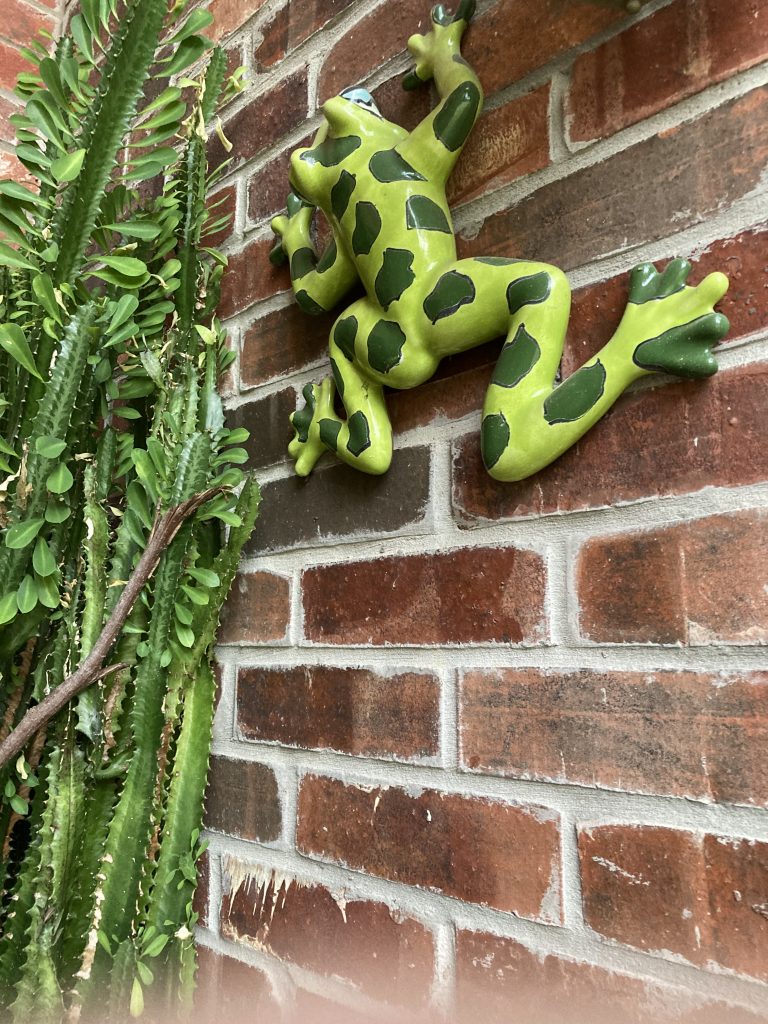
Religious art pieces in the family living room communicate a reverent and spiritual atmosphere. “We are all about our mother Mary,” Maria said.
Maria and Oscar immigrated from the Guanajuato area of Mexico many years ago. Oscar was a student at John Tyler High School, now Tyler High School, and Maria studied English at the Literacy Council of Tyler. They have two children, Mauricio and Camila.
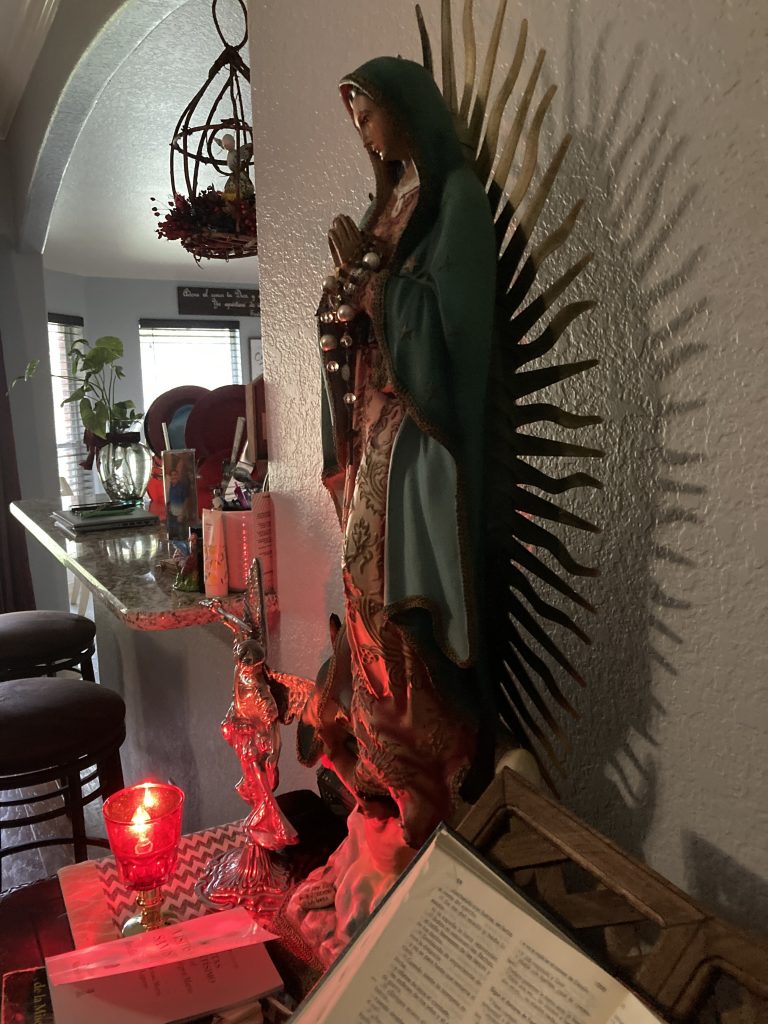
Statues of angels, an open Spanish Bible and icons of Jesus Christ arranged on a living room table create a shrine used over the years for family prayer. “We wanted to bring something back from our home in Guanajuato,” Maria said.
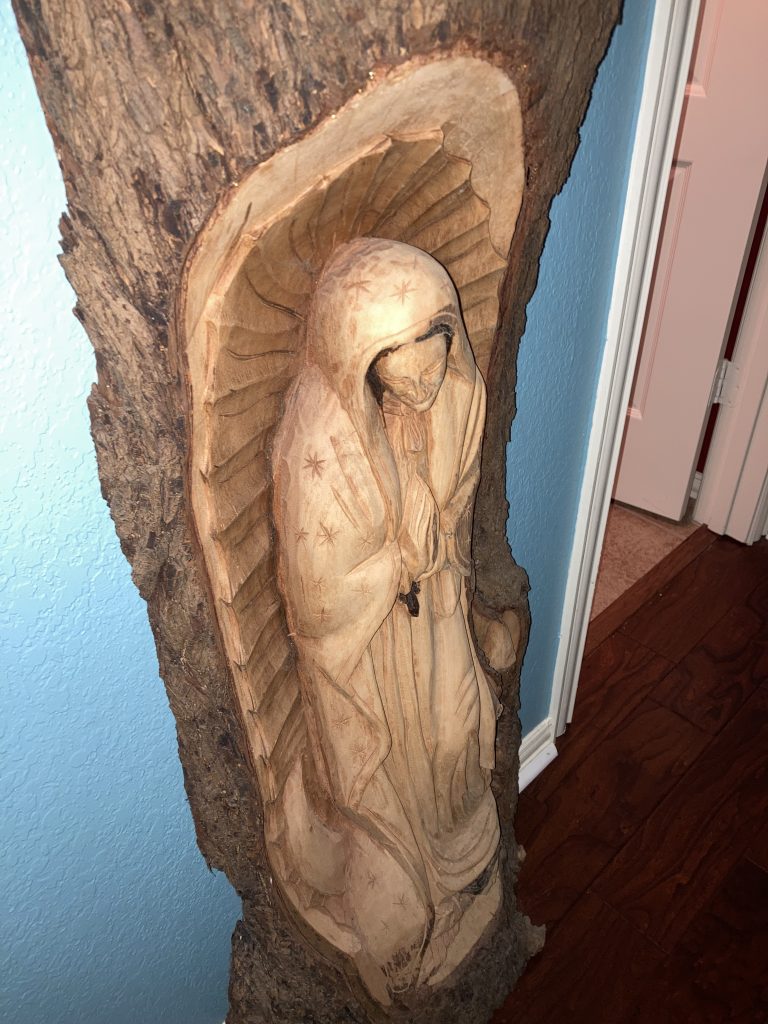
The Tapia family has dual citizenship and usually travels to Mexico each July. They also have family in California and the Tyler area.
Maria misses her native country and said the couple may someday retire in Mexico. “We are here,” she said. “Our kiddos and life are here. We feel safer. The children will make their own decisions.”
Yoli and Leo Garcia
Artist Yoli Garcia, who lives with her husband Leo in the deep woods of Ben Wheeler, begins each art piece with a message: “I love to share my culture.” The art and religious icons displayed in the Garcia home reflect the couple’s love of Peru where they met while employed as customs officers.
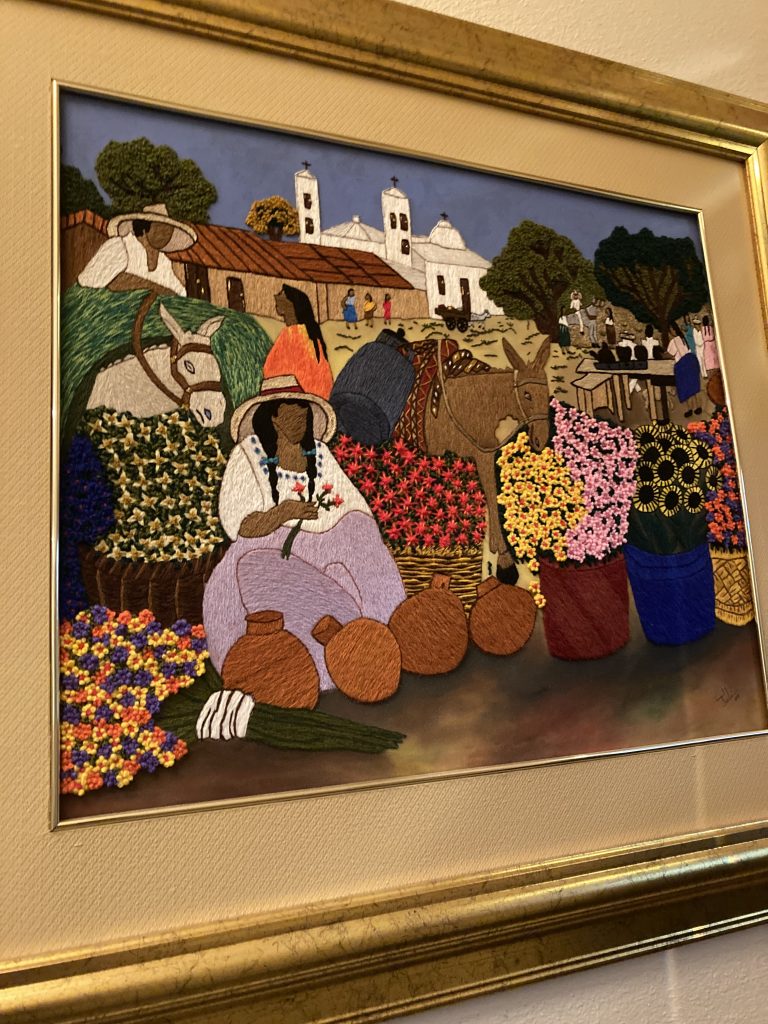
Peru is Yoli’s home country. She came to the U.S. in 1995. Leo was born in McAllen, Texas. Leo said he spoke “TexMex” but learned to speak Spanish in Peru when he and Yoli married.
After retirement, Yoli and Leo relocated to “beautiful East Texas because it is so very green.” They appreciated the “safe neighborhoods” and found people friendly and educated.
“They say ‘hello,’”Yoli said. “Men open doors, and it’s peaceful.”
Tyler’s growth drove their move to the Ben Wheeler area where they live with Yoli’s sister, Luzmila.
Opening their home and sharing food with others is an important part of home life for the Garcias. Their dog, Kona – “lady” in Hawaiian – came as a stray and completes the family.
Yoli’s embroidered art includes a flower vendor scene with vivid bouquets of every color, reflecting her love of Andean people.
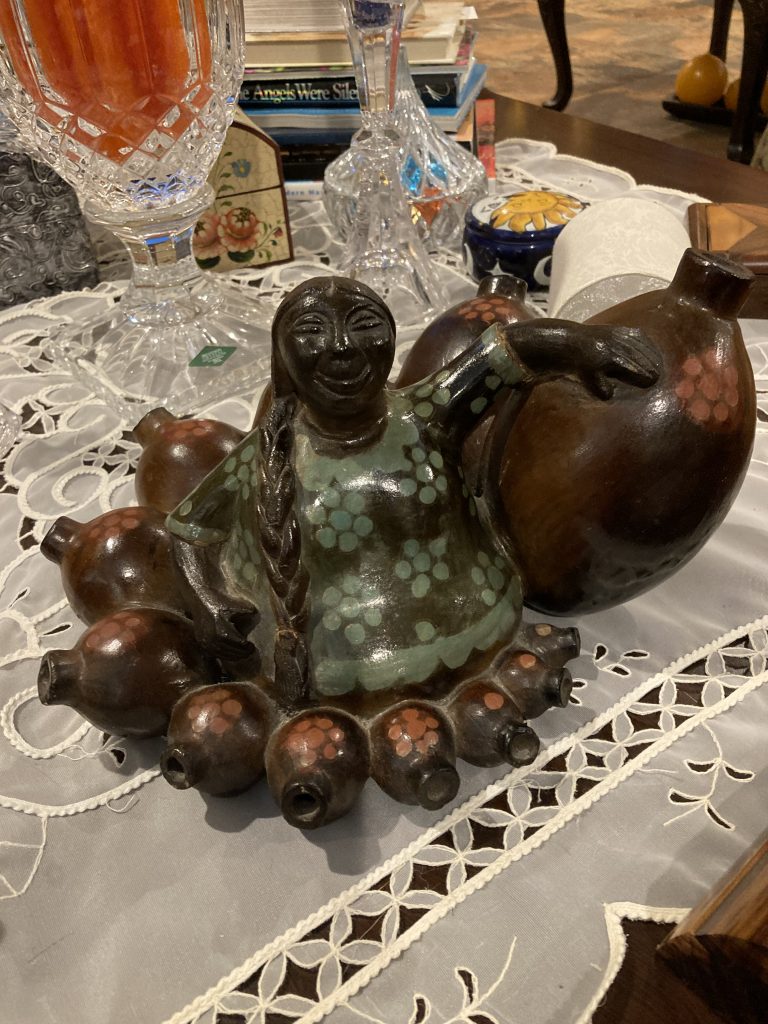
The couple treasures their collection of Viscus pottery created by the artist Chulucanas. Yoli speaks enthusiastically about her love of Northern Peru – “the city of Piura, horses, beaches and coconut palms.”
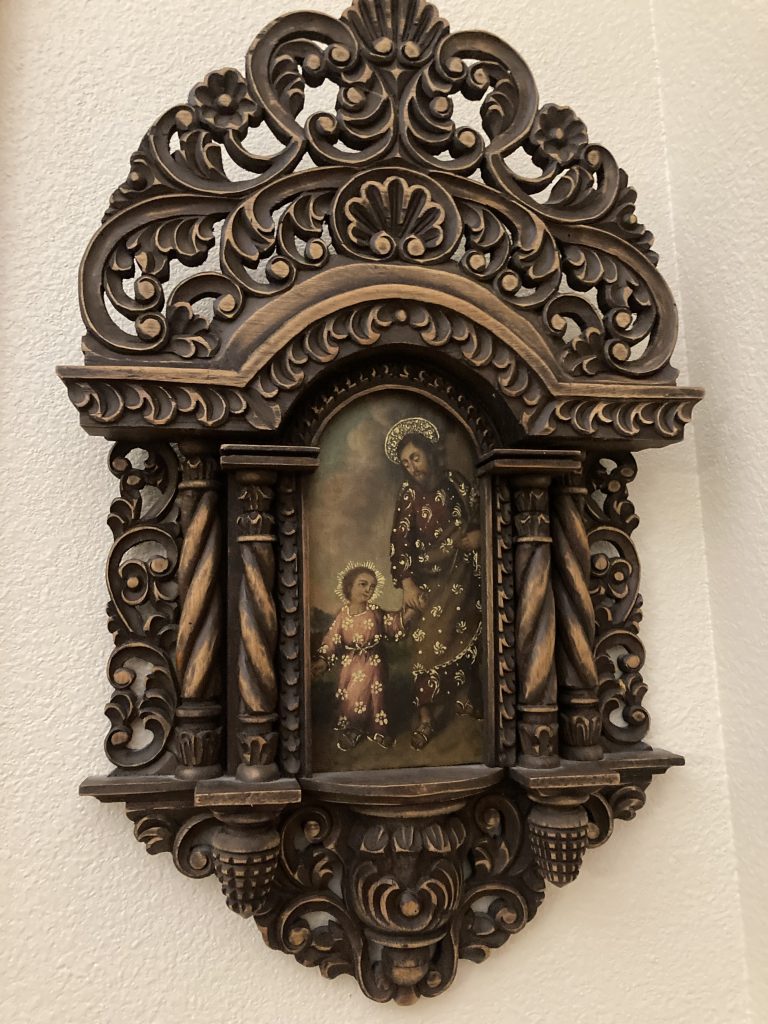
Detailed retablos, devotional paintings throughout the home, reflect the Garcias’ spirituality.
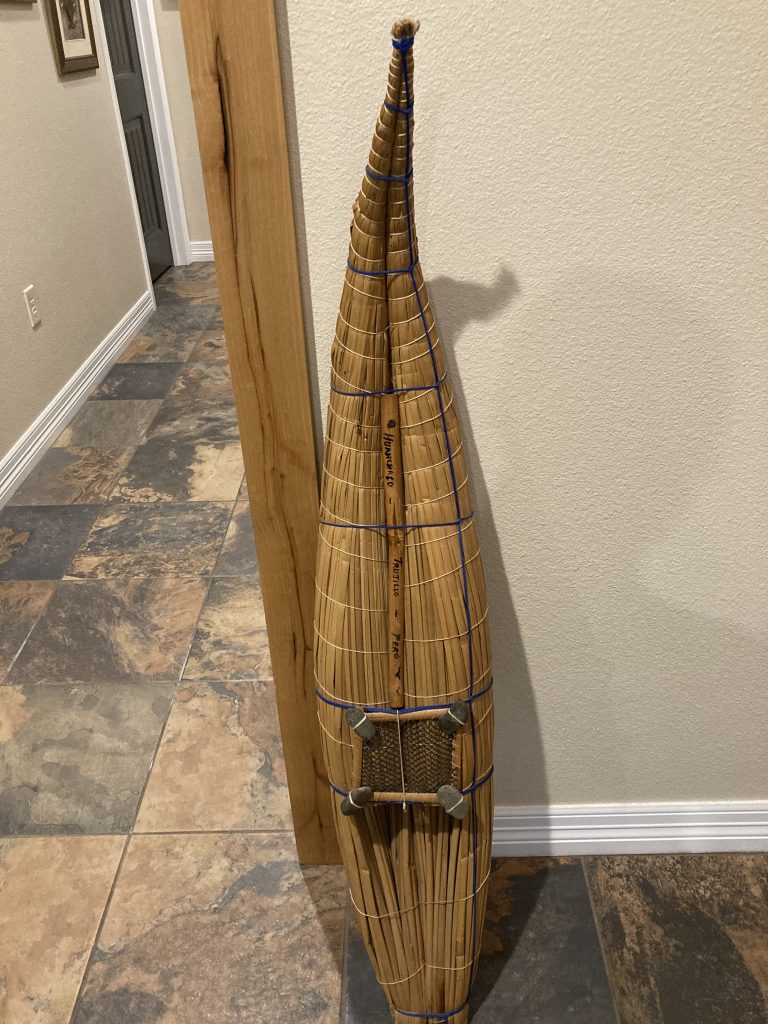
A model of the Totora horse, the reed watercraft used by Peruvian fishermen for the past 3,000 years, sits in the hallway.
The couple usually visits family in Peru about every three years. Yoli’s beliefs are interwoven with the way she creates her art. “Whatever you make of your life,” she said, “start and continue to find goals … grow and grow.”
Lorena and Eduardo Rebagliati
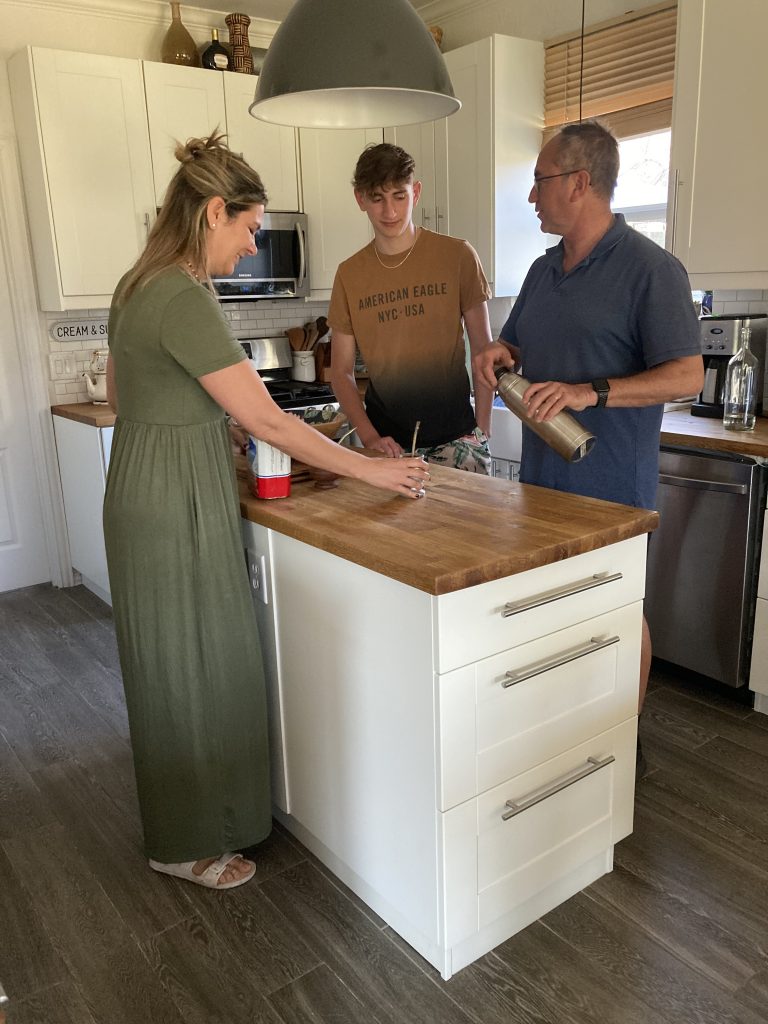
The American flag waves in the breeze at the Flint neighborhood home of Lorena and Eduardo Rebagliati and their children. Political turmoil in Argentina caused Lorena and Eduardo to ask themselves, “Do we want to raise our kids here?”
When the family moved to the U.S. from Buenos Aires in 2002, they planned to stay for two years. “We’ve been here now 20 years and counting,” said Eduardo, an electrical engineer who moved to Tyler for a job opportunity.
Lorena, who taught kindergarten in Argentina, is a student adviser for the Literacy Council of Tyler where she has “made connections and loves teaching adults even more.”
Before their move to Tyler, the Rebagliatis thought all of Texas looked like the Midland, Odessa and Amarillo landscape. They were happy to see the lakes and tall trees of East Texas.
Buenos Aires, Lorena said, has similar azaleas, weeping willows and sweet gum trees. She particularly loves the local tulip magnolias, the first to bloom in spring.
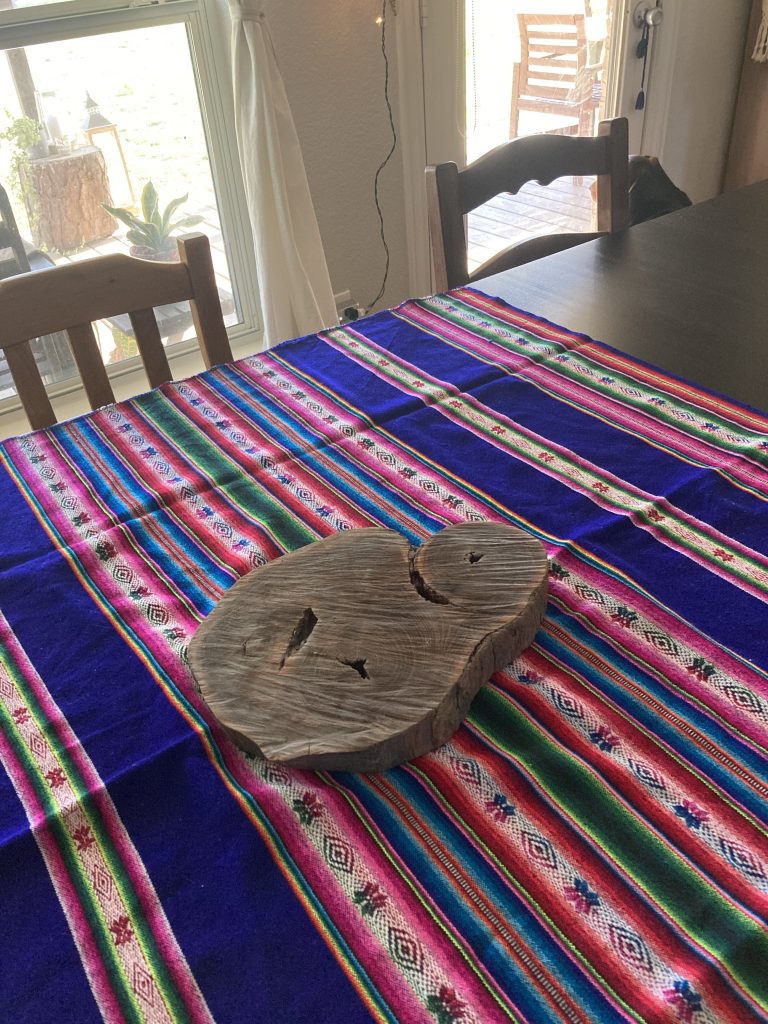
Bright colors and furnishings remind the family of their Argentinian heritage.
Their home is filled with art by Eduardo’s sister as well as family pictures Lorena brought with her.
Her father remains in Argentina along with many extended family members. Lorena and Eduardo’s son, Sebastian, is a high school junior who wants to go to aviation school. He has visited his grandparents and cousins in Argentina and often Skypes with them. Zoey is the family dog.
The Rebagliati family appreciates cooking and good food. Eduardo, who does a lot of the cooking, said that unlike eating a lot of meat in Argentina, “here it’s more veggies and pasta.”
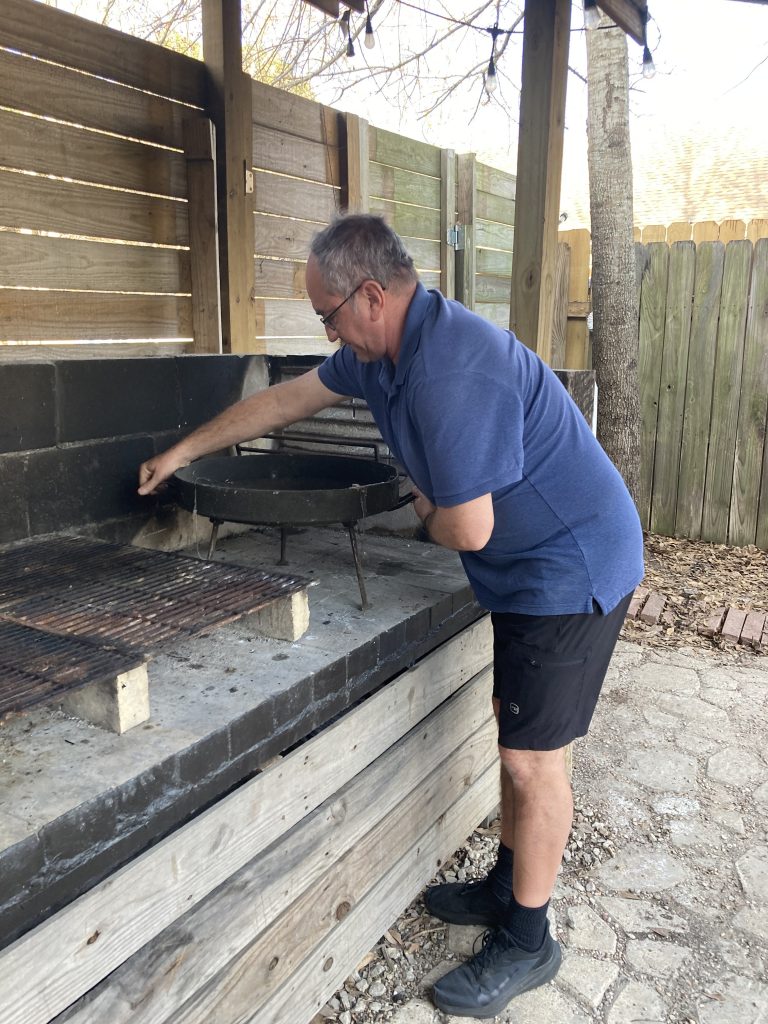
In his outdoor kitchen – “a weekend project that took a year” – Eduardo can bake a pizza, roast a turkey and cook paella and other dishes in his large outdoor cooking pot, an Argentinian disco de arado.
When asked what he needs to be happy in this country, Eduardo looks straight at Lorena, smiles, and said, “You.”
Lorena and Eduardo are dual citizens who appreciate diversity and “want to get the best out of everything,” she said.
The Rebagliatis emphasized gratitude for safety, stability and happiness they hoped to find in the U.S.
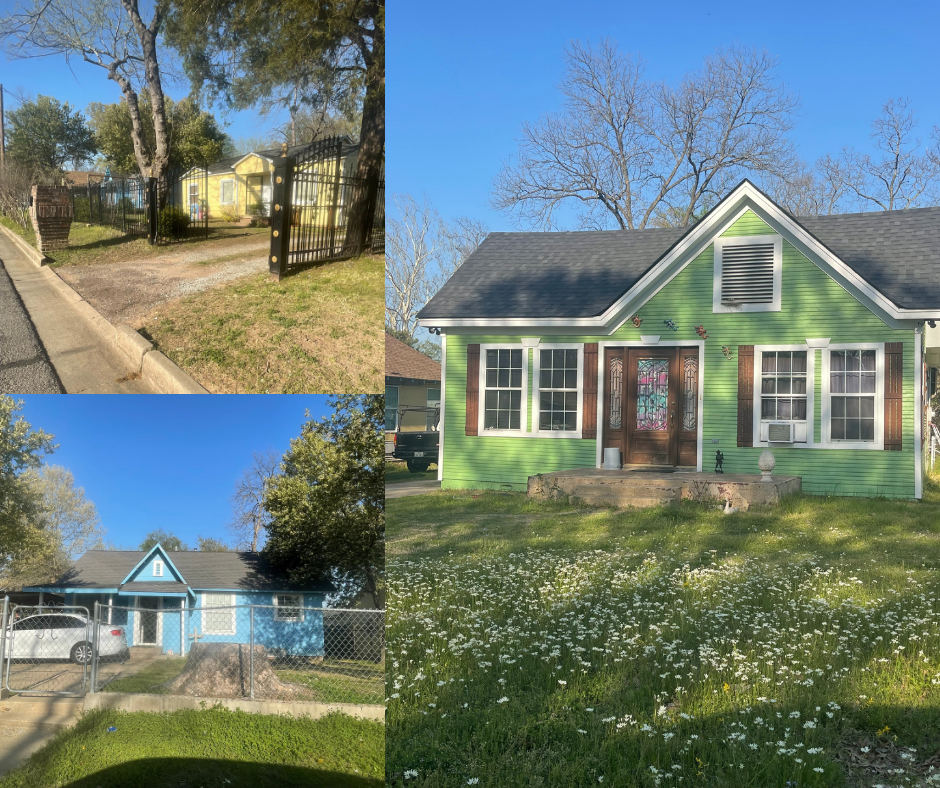
The families and the stories they tell reflect the unique experience of having their hearts in two lands: the country they left behind and the one they now call home.
Carol Thompson, a former newspaper reporter, has been published in “We Need Not Walk Alone” and National Public Radio’s (NPR) Marketplace. A member of the Rusk County Poetry Society and The Poetry Society of Texas, Carol is a coauthor of “Souls in the Sand” and “Twelve East Texas Poets.”
Josefina Vazquez was born in Mexico, but says her heart “is fully Tylerite.” She and her husband Mario have three children together. Since she was in grade school, Vasquez knew she wanted to dedicate her life to providing services to people. She works at East Texas Crisis Center.
Love what you're seeing in our posts? Help power our local, nonprofit journalism platform — from in-depth reads, to freelance training, to COVID Stories videos, to intimate portraits of East Texans through storytelling.
Our readers have told us they want to better understand this place we all call home, from Tyler's north-south divide to our city's changing demographics. What systemic issues need attention? What are are greatest concerns and hopes? What matters most to Tylerites and East Texans?
Help us create more informed, more connected, more engaged Tyler. Help us continue providing no paywall, free access posts. Become a member today. Your $15/month contribution drives our work.







